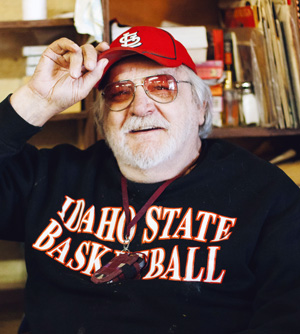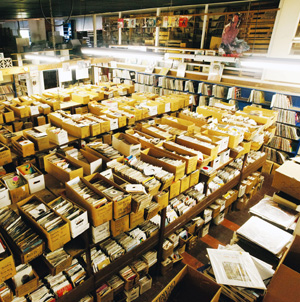
On a Thursday afternoon, Al Farleigh is closing up shop. Using his cane, he haphazardly pushes aside a stack of 45s on the floor and heads toward the two rusty, sliding gates that cover the shop’s entrance.
Standing next to an autographed Elvis Costello record and a talking parrot named Huey, Al locks up, shakes his head and says, “Well, I don’t like what’s happening. If it were up to me, I’d die here.”
What’s “happening” is the end of an era, not just for Al and his shop, but also for South Bay music, specifically South Bay vinyl history. Dusty and dimly lit, Big Al’s Record Barn, a stubborn shop that defied changing times and technology, is nearing the end of a long run. Located in a decaying stretch of shops along Bascom Avenue just north of 280, the store now exists on a month-to-month lease amid rumors that the whole block will be redeveloped into offices.
“Well, the landlady hasn’t given us any answers,” Al says. “Hopefully, we’ll get at least a 90-day notice to get everything outta here.”
Al is 79. His assistant, Joe, is a spry 88-year-old with a huge grin and a booming voice. Joe is the one who will be lugging out the half a million records in the store along with Al. Joe hasn’t missed a day of work in 25 years, according to Al, and has been 30 minutes early to every one of his shifts.
Says Joe, “Honest, I hate to see this place go. Look, I’m an old, retired truck driver, but this place gives me something to do. It’s gonna be tough, I tell ya.”
The impending closure will also be tough on local DJs, producers and audiophiles, many of whom recently discovered Al’s as an untapped resource.
Interest in vinyl has re-emerged in the last few years, evidenced by the music industry’s newer releases, many of which now include limited vinyl pressings. Vinyl not only has the capacity to sound better than other audio formats, it also serves as a trove of tools for recording artists and sound artists. DJs get their feet wet with cheap wax before investing in Serato software, and beatmakers always need unused samples. It’s a pendulum swing that, for the last few years, has swung in Al’s favor—and for all vinyl enthusiasts alike.
Allen “Overflo” Johnson, founder of Birthwrite Records, whose upcoming project is constructed entirely of rare, original African LPs, adds: “It’s certainly the single largest room of vinyl in San Jose. There’s something special within those walls that shields me from the hustle and bustle of the modern world and encapsulates me within the days of old.
“Al’s shop is decked out in LPs, 45’s, vintage album covers, retro concert posters, dusty bins, dated price tags, grumpy old men and a parrot. My most rewarding moments there are when I’ve scoured dozens of bins, spent a few hours, and suddenly I place my needle on some obscure soul 45 I had never encountered. Score!”
First Cuts
Al admits that he was never a huge record collector. Once a professional heavyweight boxer, he literally fell into the record business.
“I was a carpenter and fell off a three-story roof and was out of work for about a year,” he says. “My wife, Diane, just got a job for a jukebox company and walked into this big room filled top to bottom with 45s. Her job was to clear out the room. There used to be a flea market in Santa Clara, and I started going every week, selling off these discarded 45s for extra cash. I ended up doing pretty good and moved to Berryessa’s flea market around 1968 to sell during the weekends.”
The business quickly expanded. Al figured if he could make a living through small carpentry gigs while slanging records on the weekends, maybe he could do the records full-time. In 1969, with no credit to his name, he was able to move to El Camino Real and erected a modest storefront near where Vesuvio’s now sits.
Al bought cheap and sold for more. He took what others thought was junk. His motto was to buy every type of record ever made. He traded for what his shop lacked and what he thought might sell. He never got rich off trades but was content with making his bill payments on time. It was a simple formula, and one that worked for years.
“It was the wheeling and dealing I liked the most,” Al says.
Toward the end of the 1980s, ownership of the store’s Santa Clara property changed hands, forcing him to shelve his records in storage for six months.
“New landlords took over and doubled my rent, so I went home,” he recalls.
Even while he was out of work, he kept collecting, sometimes spending nearly his last cent on product he hoped eventually to resell.
Longtime residents might recall Big Al’s by its former name, Rowe’s Rare Records. As Al explains about settling on the Bascom spot that would be his shop for the next 20-plus years: “It was the late 1980s. I got lucky and found this current place we’re sitting in now. The owner had just passed, and his wife had no interest in the business, and I thought why the hell not.”
Along with Joe, Al and their friends lugged about 400,000 records from Al’s garage and storage. With his carpentry background, Al built every shelf, every rack and every table by hand.
“It was a mess before,” he says. “The walls were empty. Everything was just sitting on the floor.”
Al’s purchases—or investments, as he thought of them—sold well in the newly renovated area.
“The late ’70s were a great time for business,” Al tells me, “and it didn’t stop until the late ’80s. Old people, young people—everyone came. When CDs started coming around, everything died down a bit. But I was able to make ends meet. It was talking to all kinds of people that I missed the most.”




Where did all the records and posters go?